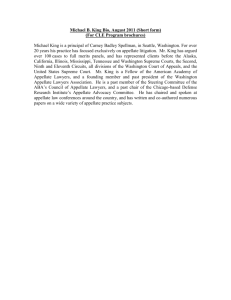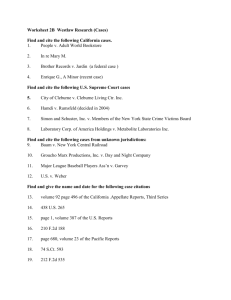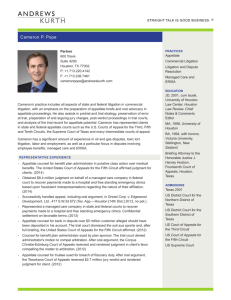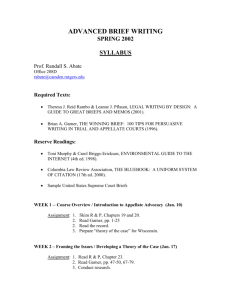Preparing to Cut the Umbilical Cord
advertisement
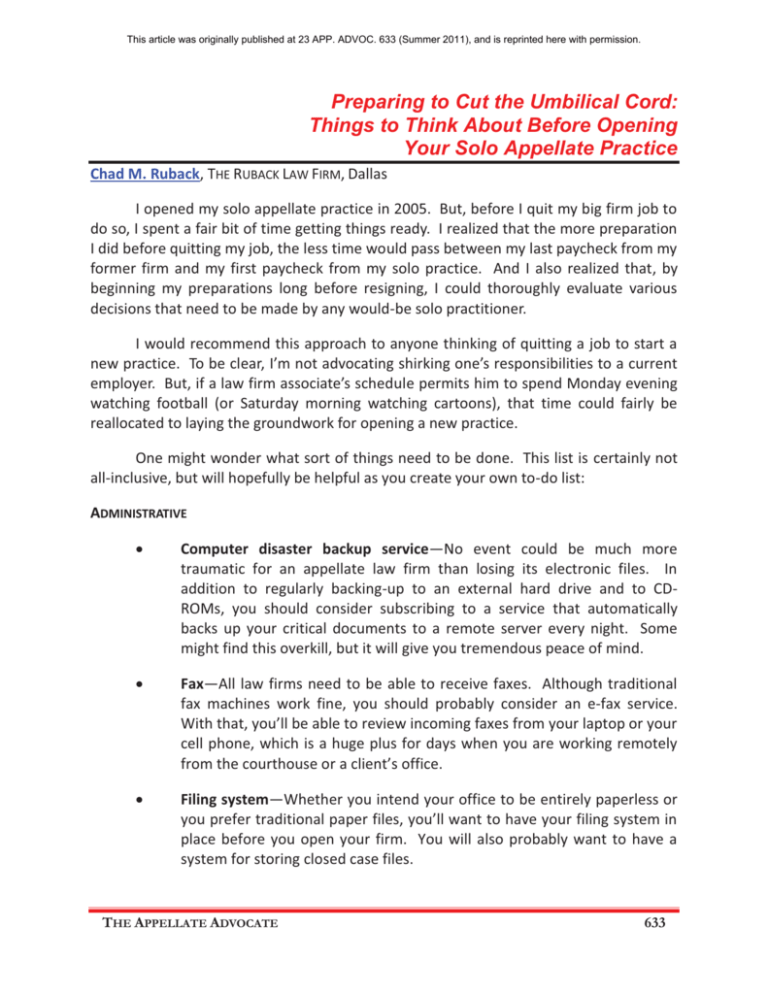
This article was originally published at 23 APP. ADVOC. 633 (Summer 2011), and is reprinted here with permission. Preparing to Cut the Umbilical Cord: Things to Think About Before Opening Your Solo Appellate Practice Chad M. Ruback, THE RUBACK LAW FIRM, Dallas I opened my solo appellate practice in 2005. But, before I quit my big firm job to do so, I spent a fair bit of time getting things ready. I realized that the more preparation I did before quitting my job, the less time would pass between my last paycheck from my former firm and my first paycheck from my solo practice. And I also realized that, by beginning my preparations long before resigning, I could thoroughly evaluate various decisions that need to be made by any would-be solo practitioner. I would recommend this approach to anyone thinking of quitting a job to start a new practice. To be clear, I’m not advocating shirking one’s responsibilities to a current employer. But, if a law firm associate’s schedule permits him to spend Monday evening watching football (or Saturday morning watching cartoons), that time could fairly be reallocated to laying the groundwork for opening a new practice. One might wonder what sort of things need to be done. This list is certainly not all-inclusive, but will hopefully be helpful as you create your own to-do list: ADMINISTRATIVE x Computer disaster backup service—No event could be much more traumatic for an appellate law firm than losing its electronic files. In addition to regularly backing-up to an external hard drive and to CDROMs, you should consider subscribing to a service that automatically backs up your critical documents to a remote server every night. Some might find this overkill, but it will give you tremendous peace of mind. x Fax—All law firms need to be able to receive faxes. Although traditional fax machines work fine, you should probably consider an e-fax service. With that, you’ll be able to review incoming faxes from your laptop or your cell phone, which is a huge plus for days when you are working remotely from the courthouse or a client’s office. x Filing system—Whether you intend your office to be entirely paperless or you prefer traditional paper files, you’ll want to have your filing system in place before you open your firm. You will also probably want to have a system for storing closed case files. THE APPELLATE ADVOCATE 633 This article was originally published at 23 APP. ADVOC. 633 (Summer 2011), and is reprinted here with permission. x Internet service—Depending on whether the office you choose includes Internet service, you might need to investigate different Internet service providers. If you plan to do much work out of your office (e.g., the courthouse, clients’ offices), you might investigate subscribing to a cellular Internet access plan from one of the wireless phone companies. x Make a list of snail-mail correspondents—Many lawyers prefer emails to U.S. Mail, but some people who send important correspondence resist transitioning to email (kudos, by the way, to the editors of the Appellate Advocate for recently having begun delivery via email). A few months before resigning your current position, you should begin watching your mail closely and making a list of these people. Then, when you are ready to announce your new firm, you won’t have to rack your brain to remember whom to contact with an address change request. You definitely don’t want to forget to update your mailing address with the state bar, local bar associations, or courts. x Office supplies—In an established law firm, appellate lawyers don’t need to think about whether they have paper, pens, staples, and other basic office supplies. These things just seem to magically appear. But, when you open your own firm, you will no longer be able to rely upon “firm administration” to make sure that you have ample supplies. x Phone number—Regardless of where you decide to office, be sure to secure a phone number that you can take with you when you move your office someday. If you decide to share office space (or rent an executive suite), don’t make the mistake of using a number that belongs to your landlord . . . because the landlord might keep that number when you move out. x Technology—Technology will probably be the largest up-front expense of your new law firm. As such, it is worth spending some time evaluating the capabilities and prices of various options. Computer servers, laptops, scanners, copy machines, cellular phones, and land-line phone systems, among other things, simply should not be purchased with wild abandon. BRICK-AND-MORTAR x 634 Furniture—Unless your office will come furnished, you will likely need to buy some office furniture. THE APPELLATE ADVOCATE This article was originally published at 23 APP. ADVOC. 633 (Summer 2011), and is reprinted here with permission. x Office—When it comes to securing office space, there are many options to explore. In addition to the traditional law firm model, you might consider renting space in an executive suite or subletting an unused room from another small firm. For the two latter options, having litigators as officemates could mean a steady stream of referrals. You might want your office near your home, near the courthouse, or near the offices of potential clients. The less time that you spend in the car, the more time you can spend building your new practice. A recognizable street address could make a newly-minted law firm seem more credible. All things being equal, a potential client might prefer to hire a lawyer who offices on “Main Street” as opposed to one who offices on “Whispering Meadow Lane.” A spacious conference room is a near-must for an appellate law firm, as potential clients often like to spread out documents for an appellate lawyer’s review. x Emergency back-up lawyer—At some point, you or a family member might have a health issue that will unexpectedly keep you away from your practice. Or an emergency might arise in one of your cases while you are on vacation. You might want to arrange in advance for another lawyer to cover for you in case such a need arises. x Insurance—Health insurance, disability insurance, malpractice insurance, business property insurance, business liability insurance, business interruption insurance, life insurance, and workers’ comp insurance are all products you may wish to consider. HR THE APPELLATE ADVOCATE 635 This article was originally published at 23 APP. ADVOC. 633 (Summer 2011), and is reprinted here with permission. x Staffing—In an informal survey I took of Texas appellate solos, easily the most-often-cited concern was staffing. As the first contact a potential client has with your firm, the person answering your phone can be a critical factor in your success. You could consider hiring a full-time secretary/paralegal, sharing a receptionist with officemates, or using an answering service. Equally important is who will be helping you meet appellate deadlines. You could consider hiring a law student, working with a contract lawyer, or referring work back-and-forth with another appellate solo. The cost of hiring one experienced paralegal would likely exceed all of your other recurring expenses combined, so this is not a decision to be made lightly. Some appellate solos attribute their rapid success to the work of a talented full-time staff member. Others attribute their success to postponing the expense of hiring a full-time staff member until absolutely necessary. LEGAL RESEARCH x Online legal research—While free legal research sites have improved dramatically over the past several years, it is doubtful that these resources would meet the demands of most appellate lawyers. So, you will likely need to buy a subscription from an online legal research company. While there are very few such companies, each company does offer myriad different subscription options. And thoroughly considering these options can ensure that you won’t be paying every month for services you don’t need or, possibly worse, being hit with a huge bill for research performed outside of your subscription. x Reference books—In addition to online legal research, you should give thought to purchasing a few reference books (e.g., O’Connor’s Texas Civil Appeals). MARKETING x 636 Announcements—Consider how you’ll be announcing your new firm. Texas Lawyer, the Texas Bar Bulletin, and many local bar association newsletters will run an announcement about your new law firm free-ofcharge. A blast email to all of your personal and professional contacts is also cost-effective. Additionally, you should consider sharing the good news via Facebook, Twitter, and LinkedIn. Snail-mail announcements aren’t as common as they once were, but can still be effective. THE APPELLATE ADVOCATE This article was originally published at 23 APP. ADVOC. 633 (Summer 2011), and is reprinted here with permission. x Business cards and letterhead—Generally, you should try to keep your new law firm’s overhead low. But business cards are one place you shouldn’t skimp. Many more prospective clients will see your business card than will ever visit your office. And while a blue-collar worker likely wouldn’t notice if your business card was printed on-the-cheap, a litigator looking to refer-out an appeal might snicker at such a card. Although seen less frequently by potential clients than business cards, the same issues apply to letterhead. x Domain name—A Yahoo email address is for yahoos. Hotmail and Gmail are similarly unprofessional. To be taken seriously by prospective clients, a lawyer needs to own his own domain name. Whether that domain is derived from your name (e.g., ruback.com) or your practice area (e.g., appeal.pro) is a matter of personal preference. But using an AOL email address suggests to potential clients that you aren’t technologically savvy. x Firm name—Although the state bar rules limit your options in naming your firm, you do still have some options. It might seem inconsequential whether your firm name should include the word “the”; whether your firm name should include your middle initial; whether to hyphenate “attorney at law” in your firm name; or whether “office” should be singular or plural. But you nevertheless might want to give this some thought. Among many others, successful Texas solo appellate practices have used the following monikers: (1) Smith Law Group, P.C.; (2) Law Offices of Scott Rothenberg; (3) The Law Office of Don Cruse; (4) Law Offices of Martin J. Siegel; (5) The Holman Law Firm; (6) The Forbes Firm, PLLC; (7) C. Alfred Mackenzie, Attorney at Law; (8) Alan B. Daughtry, Attorney-at-Law; (9) Timothy A. Hootman, Lawyer; (10) Kurt Kuhn, PLLC; (11) Walter James Kronzer, III, P.C.; and (12) Daryl L. Moore, P.C. THE APPELLATE ADVOCATE 637 This article was originally published at 23 APP. ADVOC. 633 (Summer 2011), and is reprinted here with permission. x Marketing plan—While a written marketing plan may not be needed, at a minimum, you should give some thought to how you plan to cultivate business. It’s always fun to hang out with other appellate lawyers. But you might find that marketing to trial court litigators is a much more effective use of your time and money. You might consider becoming a regular attendee at meetings of organizations composed primarily of trial court litigators (such as Inns of Court, suburban bar associations, and trialoriented sections of the big city bar associations). And then following-up with people you meet at such meetings, making plans to meet-up for lunch or cocktails to solidify newfound relationships. Of course, you should always be on the lookout for opportunities to be the featured speaker at such meetings. You might also consider submitting articles for publication in periodicals read by trial court litigators (such as bar association newsletters, Texas Lawyer, and even the local business journal). You can, and probably should, begin implementing these business development strategies long before you open your own firm. It can take quite a while to develop a good network of potential referral sources. Some of the most successful appellate solos will readily admit that they spent years developing their network of potential referral sources before opening their own firms. Shortly before you do open your firm, you might want to look into getting a listing in the Texas Legal Directory, known as “The Blue Books,” which is reasonably-priced and lends credibility with some lawyers. You might also want to check out directories published by local bar associations. x Website—It takes a long time to write content for a robust website. But a law practice should, at a minimum, have a web page with the lawyer’s name and contact information. If a potential client types your domain into his web browser and sees an “under construction” message, he might think that your law firm isn’t yet open for business. MONEY x 638 Accounting and billing—If you do not timely send out bills, you increase your odds of not getting paid. More importantly, if you do not file an accurate tax return, you increase your odds of being incarcerated. As boring as accounting/billing software might be, it deserves your full attention. You might investigate software designed specifically for lawyers (whose trust account requirements can make general-purpose accounting software less than ideal). You should also consider developing a good working relationship with an accountant. THE APPELLATE ADVOCATE This article was originally published at 23 APP. ADVOC. 633 (Summer 2011), and is reprinted here with permission. x Bank accounts—It takes a little while to research what bank might be the best for your operating account and your IOLTA account. While convenience of bank branch location is certainly a consideration, it should not be the only consideration. Banks vary in regard to hours of operation, minimum balances, monthly fees, and services offered. x Business entity—Many appellate lawyers probably haven’t studied business entities since law school. Before opening the doors to your new firm, you should evaluate the pros and cons of operating as a sole proprietorship, a professional corporation, and a professional limited liability company, among others. If you choose an option other than sole proprietorship, you will likely need to register your entity with the Texas Secretary of State and get a tax identification number from the Internal Revenue Service. x Fee structure—Regardless of whether you intend to bill by the hour, be paid a contingency fee, or charge a flat fee, you will probably want to survey other appellate lawyers to get an idea of what would constitute fair payment for your services. x Savings—It will likely take at least a few months before your new law firm brings in enough revenue to cover expenses and have a surplus large enough for you to take home money to rival your salary at an established firm. So, be sure that you have savings sufficient to cover your living expenses during this time period. * * * STAYING OUT OF TROUBLE x Conflicts check—There are software programs designed to perform conflicts checks, but you may find that a spreadsheet is equally effective. Work which you performed at your prior firm could also pose a conflict, and consequently, should be incorporated into whatever conflicts check system you use at your new firm. x Ethical considerations—You should study the ethical considerations regarding soliciting work from clients of your current firm. THE APPELLATE ADVOCATE 639 This article was originally published at 23 APP. ADVOC. 633 (Summer 2011), and is reprinted here with permission. x Mentorship—You should consider developing a network of mentors. It is unlikely that you will find one person who would be a good mentor for every aspect of your practice. A partner in the appellate section of a large firm might be a good mentor for appellate advocacy, a business litigator at a medium-sized firm might be a good mentor for business development, and a general practice sole practitioner might be a good mentor for law office management. In preparing this article, I reached out to all of the solo appellate lawyers I could locate in Texas. Over eighty percent of them responded with helpful suggestions. And this confirms my longstanding belief that appellate lawyers are eager to help one another. If you ever decide to join the ranks of us solos, please let us know how we can help you. Planning on attending the Advanced Course this September but wondering how to pay for it? Did you know the Appellate Section offers a limited number of need-based scholarships each year to attend either or both the Advanced Course and 101 Course? The available scholarships include partial awards whereby the discounted cost to attend the 101 Course is $75.00 and the discounted cost to attend the full Advanced Course is $150.00. A limited number of full scholarships are also available. Please contact Jeff Levinger at 214-754-9199 or jlevinger@hanklev.com for more information. 640 THE APPELLATE ADVOCATE
